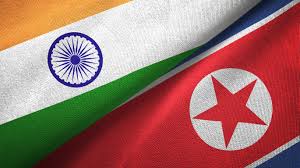In a move steeped in historical and geopolitical significance, India has restored its embassy operations in Pyongyang, marking a return to formal diplomatic engagement after a hiatus since 2021.
While this development has been downplayed in much of the Western press, it highlights the enduring ties between the two nations, forged in the Cold War era and reasserted now amidst the shifting landscape of global power.
Historical Ties: A Partnership Rooted in Trade and Pragmatism
India and the DPRK share a legacy of pragmatic relations that date back to the mid-20th century. During the Cold War, India’s alignment with the Soviet Union naturally extended to cooperative ties with Pyongyang, whose own policies often mirrored Moscow’s broader global strategy. This alignment was neither ideological nor opportunistic—it was practical.
By the 1970s and 1980s, trade between India and the DPRK became a critical part of their relationship. India exported essential goods, including foodstuffs, textiles, and pharmaceuticals, while importing machinery and raw materials from Pyongyang. These exchanges provided a vital lifeline for the DPRK during an era of heavy Western sanctions, and for India, they reinforced its role as a partner willing to engage outside the confines of Western dictates.
Even as the world changed post-Cold War, this foundation of trade persisted. In the 2000s, India was one of Pyongyang’s top trading partners outside of China, a relationship that continued under the radar despite escalating international restrictions.
Cold War 2.0: Navigating Sanctions and Alliances
The reopening of India’s embassy in Pyongyang cannot be divorced from the broader context of Cold War 2.0. As the United States and its allies ramp up sanctions as tools of containment, countries like India are increasingly looking to assert their independence. While India officially complies with UN sanctions, its diplomatic engagement with the DPRK signals a willingness to explore avenues that benefit its own strategic and economic interests.
For decades, Pyongyang has demonstrated remarkable resilience in circumventing sanctions, leveraging partnerships with countries like India to maintain access to vital resources. India, in turn, has shown an ability to operate in spaces that Western powers often write off as untouchable.
This reopening may also indicate a growing awareness that isolating Pyongyang does little to foster regional stability. With India’s influence in the Global South, maintaining a channel with the DPRK allows it to position itself as a mediator capable of balancing relationships between powers like the United States, China, and Russia.
Trade: The Quiet Cornerstone
While military exercises and missile tests often dominate headlines about the DPRK, trade has always been its quieter yet equally important lifeline. In recent years, India’s exports to Pyongyang have largely fallen under humanitarian exemptions, focusing on medical supplies and foodstuffs. Yet, these shipments are a reminder of the long-standing economic partnership between the two nations.
In the past, bilateral trade figures ranged in the hundreds of millions of dollars annually. Although these numbers have sharply declined due to sanctions, the framework for economic cooperation remains intact. Both nations understand the mutual benefits of a relationship that bypasses Western influence while serving as a blueprint for other Global South countries looking to chart their own paths.
A Shift in Global Dynamics
The reopening of the embassy also highlights a broader trend: the willingness of countries to circumvent the West’s rigid geopolitical frameworks. Sanctions may dominate the rhetoric of Cold War 2.0, but they often fail to account for the realities on the ground. India’s move is a clear signal that trade, diplomacy, and regional stability will always trump ideological posturing.
For Pyongyang, India’s renewed presence is a welcome development that reinforces its long-standing strategy of building bridges with non-Western nations. And not only that, but a positive overall shift in global relations following a previous reduction in their missions.
Looking Ahead
While Western observers may view India’s diplomatic overtures to the DPRK with skepticism, the reality is far more nuanced. This is not an alliance of convenience but a relationship deeply rooted in decades of trade, cooperation, and mutual respect.
As the global order continues to fracture, partnerships like that between India and Pyongyang will become increasingly significant. They are a reminder that diplomacy is not always dictated by headlines but by shared histories and practical needs. In the era of Cold War 2.0, such relationships may yet redefine how nations navigate an increasingly divided world.

